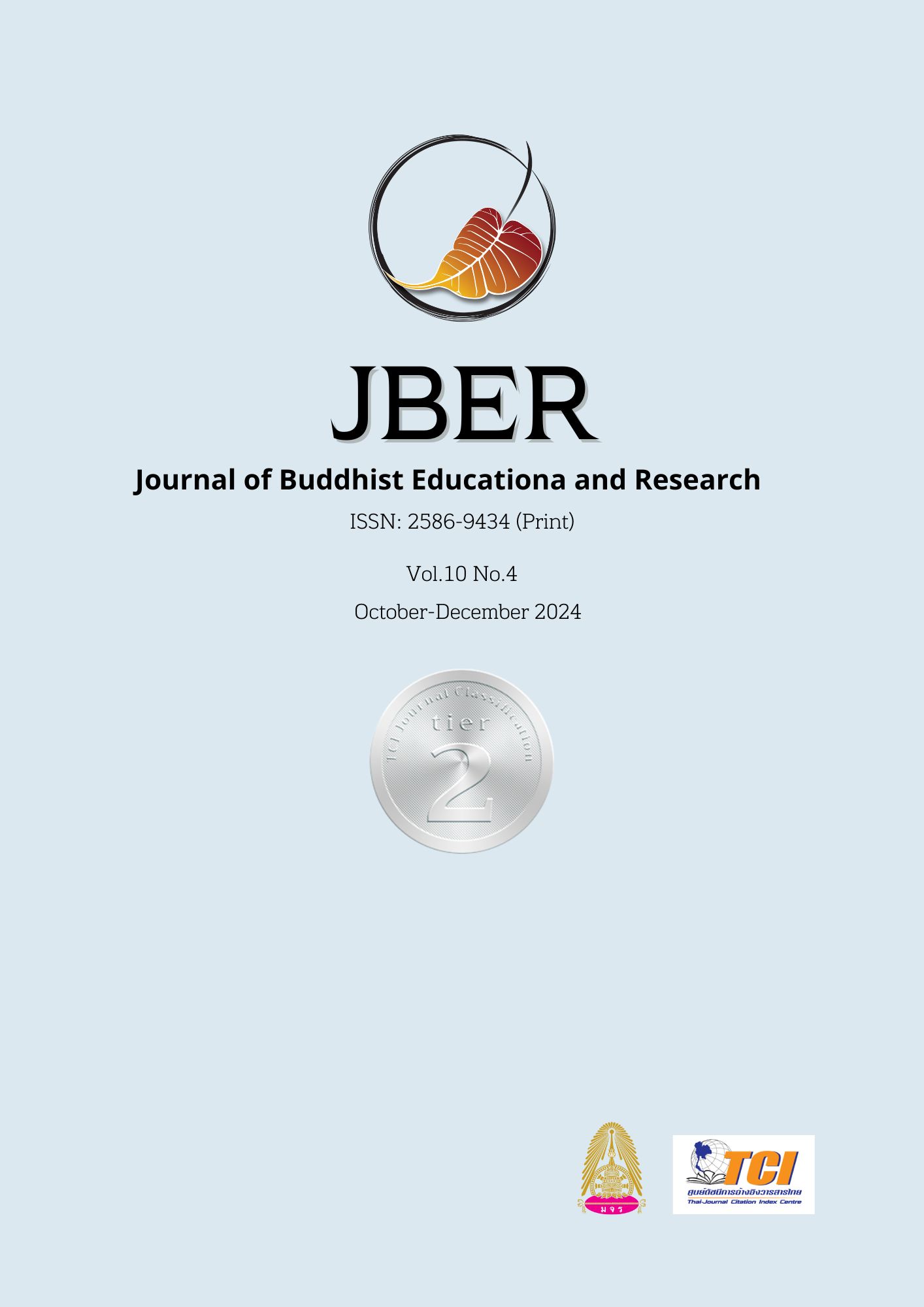Result Based Management According to the Four Iddhipāda Dhammas of School Administrators Under Office of the Promotion of Non-Formal and Informal Education, Udon Thani Province
Abstract
This research aimed to: 1. study results-oriented administration according to the Four Iddhipāda Principles by educational institution administrators under the Udon Thani Provincial Office of Non-Formal and Informal Education, 2. explore guidelines for results-oriented administration according to the Four Iddhipāda Principles for educational institution administrators in the same organization. This study used a mixed-methods approach, combining quantitative and qualitative research. The quantitative aspect involved a survey (questionnaire) with 240 respondents, while the qualitative aspect used interviews with 12 key informants. Data analysis for the quantitative part used frequency distribution, percentage, mean, and standard deviation, while the qualitative part employed content analysis. The research results were as follows: 1. The results-oriented administration according to the Four Iddhipāda Principles by educational institution administrators under the Udon Thani Provincial Office of Non-Formal and Informal Education, was at the highest level overall and across all individual aspects. 2. The key guidelines for results-oriented administration according to the Four Iddhipāda Principles include: (1) establishing a management system for budget administration across each fiscal quarter, ensuring proper allocation and analysis based on budget management systems (E-budget); (2) considering the results of non-formal education at the basic education level, including the academic achievement of non-formal students; (3) creating a school management system that encourages staff participation and collaboration; (4) designing learning experiences that focus on knowledge, skills, and morals in continuous education; (5) promoting a range of non-formal educational activities and programs to enhance the knowledge, skills, or experiences of service recipients.
References
กระทรวงศึกษาธิการ. (2551). พระราชบัญญัติส่งเสริมการศึกษานอกระบบและการศึกษาตามอัธยาศัย. กรุงเทพมหานคร: กระทรวงศึกษาธิการ.
กระทรวงศึกษาธิการ. (2545). พระราชบัญญัติระเบียบบริหารราชการแผ่นดิน. กรุงเทพมหานคร: กระทรวงศึกษาธิการ.
ทศพร ศิริสัมพันธ์. (2543). การบริหารผลการดำเนินงาน (Performance Management). ใน รวมบทความวิชาการ 100 ปี รัฐประศาสนศาสตร์ไทย (หน้า 8). ภาควิชารัฐประศาสนศาสตร์ คณะรัฐศาสตร์ จุฬาลงกรณ์มหาวิทยาลัย.
ปิยะชัย จันทรวงษ์ ไพศาล. (2554). การบริหารมุ่งผลสัมฤทธิ์. กรุงเทพมหานคร: บ้านหนังสือโกสินทร์.
พระครูวินัยธรวรวุฒิ เตชธมฺโม (เฮียงเหี่ย), พระครูปลัดบุญช่วย โชติวํโส, สุนทร สายคํา, อมรรัตน์ เตชะนอก, & สัมฤทธิ์ กางเพ็ง. (2566). การวิจัยแบบผสมผสานวิธีทางพุทธบริหารการศึกษา. วารสารครุศาสตร์ปัญญา, 2(2), 68-69.
ยุพิน ขุนทอง. (ม.ป.ป.). การบริหารงานวิชาการสู่ความเป็นเลิศตามหลักอิทธิบาท 4 ในสถานศึกษาขั้นพื้นฐาน สังกัดสำนักงานเขตพื้นที่การศึกษามัธยมศึกษาเขต 25. วิทยานิพนธ์พุทธศาสตรมหาบัณฑิต สาขาวิชาการบริหารการศึกษา, บัณฑิตวิทยาลัย มหาวิทยาลัยมหาจุฬาลงกรณราชวิทยาลัย. บทคัดย่อ.
วรินทร์ วิรุณพันธ์. (2565). รายงานการประเมินความสำเร็จของการดำเนินงานตามรูปแบบการบริหารแบบมุ่งผลสัมฤทธิ์ (Result Based Management: RBM) ของสถานศึกษาในสังกัดสำนักงาน กศน. จังหวัดอุดรธานีประจำปีงบประมาณ.
ศักดิ์ดา แดงเถิน. (2555). การบริหารโรงเรียนโดยใช้หลักการบริหารแบบมุ่งผลสัมฤทธิ์ของผู้บริหารโรงเรียนตามทัศนะของครูในสำนักงานเขตภาษีเจริญ สังกัดกรุงเทพมหานคร. วิทยานิพนธ์ครุศาสตรมหาบัณฑิต สาขาการบริหารการศึกษา, บัณฑิตวิทยาลัย มหาวิทยาลัยราชภัฏธนบุรี.
สำนักงานคณะกรรมการพัฒนาการเศรษฐกิจและสังคมแห่งชาติ สำนักนายกรัฐมนตรี. (2561). สรุปสาระสำคัญแผนการพัฒนาเศรษฐกิจและสังคมแห่งชาติ ฉบับที่ 12 (พ.ศ. 2560 – 2564), 22(มีนาคม), 4.
Downloads
Published
How to Cite
Issue
Section
License
Copyright (c) 2024 Journal of Buddhist Education and Research (JBER)

This work is licensed under a Creative Commons Attribution-NonCommercial-NoDerivatives 4.0 International License.





